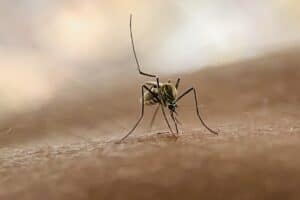The researchers found the ability to transmit the disease was decreased in mosquitoes infected with the parasite.

Scientists at the University of the Witwatersrand (Wits) have infected mosquitoes with malaria, discovering new compounds that might be a breakthrough in the treatment of the disease.
Scientists at the Wits Research Institute for Malaria (WRIM) in partnership with the University of Pretoria and colleagues in the US, Spain, and Switzerland, have identified novel anti-plasmodial lead compounds that could be used for mass drug administration and vector control to eliminate malaria.
The study’s findings were published in the journal Nature Communications this week.
Professor Lizette Koekemoer, co-director of WRIM and the National Research Foundation SARChI Chair in Medical Entomology and Control, who co-authored the research paper, said the team established a mosquito malaria infection centre at the Faculty of Health Sciences at Wits University, where the mosquito transmission blocking experiments took place.
“The WRIM infection centre is the only facility in South Africa and in the southern African region that can artificially infect mosquitoes with the human malaria parasite.
“The infection centre provided the high level of expertise required to infect mosquitoes with the human malaria parasite and allowed for this unique study to be done,” she said.
Ten days after infection, the mosquito guts were removed and the number of malaria parasites counted and compared against those mosquitoes that received only an infected blood meal without treatment.
The researchers found the ability to transmit the disease was decreased in mosquitoes infected with the parasite.
Koekemoer said: “Normally, how a mosquito is able to transmit malaria is that it has to feed on somebody who has [the] malaria parasite. This can be someone who carries the malaria parasite, but is not sick.
“The female mosquito will feed on somebody with the malaria parasite and then when that mosquito 12 to 14 days later bites someone else, she can then transmit the disease.”
Their research now meant that if someone with the malaria parasite was given a drug with the compound, the mosquito would not be able to spread the disease to other people.
“What will happen is that you will now have to screen the community to see if they have malaria parasites in their bloodstream. You can do this very quickly with a blood test.
“If you then see that the person carries the malaria parasite, you then give them a prophylactic drug or a treatment drug and the parasite will then be cleared from the human.
“Mosquitoes will still come feed on that person, but just won’t be able to transmit the disease,” Koekemoer said.
She said while it was still early days, the research paved way for the eradication of malaria.
“It’s very early days, but it is very nice that we have the expertise here now in this country for future studies.
“The compound that has been identified at this lab phase will then go further. We need to make sure they are safe for humans.
“Normally a drug, it doesn’t matter for what disease, can take up to 15 years in development. We are looking at a five to 10 year period, unfortunately. But I think it is good to not rush things,” she said.
In 2019, there were an estimated 229 million malaria cases in 2019 and 409,000 deaths – mostly babies – around the world, according to the World Health Organisation.
On why it was so hard to fight malaria, Koekemoer said: “It’s a multifactorial disease because you need the human and then the mosquito and the parasite.
“In most situations it’s difficult to control malaria because either the area where it occurs is very rural and sending the controls to the people is very challenging.
“In Africa, we know that political stability is a big thing. You need money.
“South Africa has a great malaria programme, but it costs money and other African countries don’t have the resources to do that. They depend on donor funding that comes with conditions.”
For more news your way, download The Citizen’s app for iOS and Android.
Support Local Journalism
Add The Citizen as a Preferred Source on Google and follow us on Google News to see more of our trusted reporting in Google News and Top Stories.








